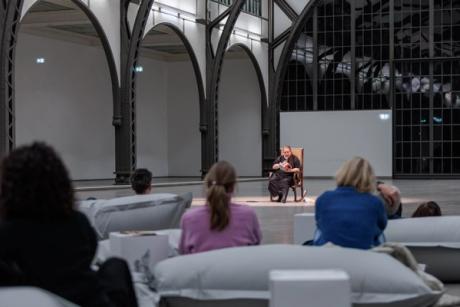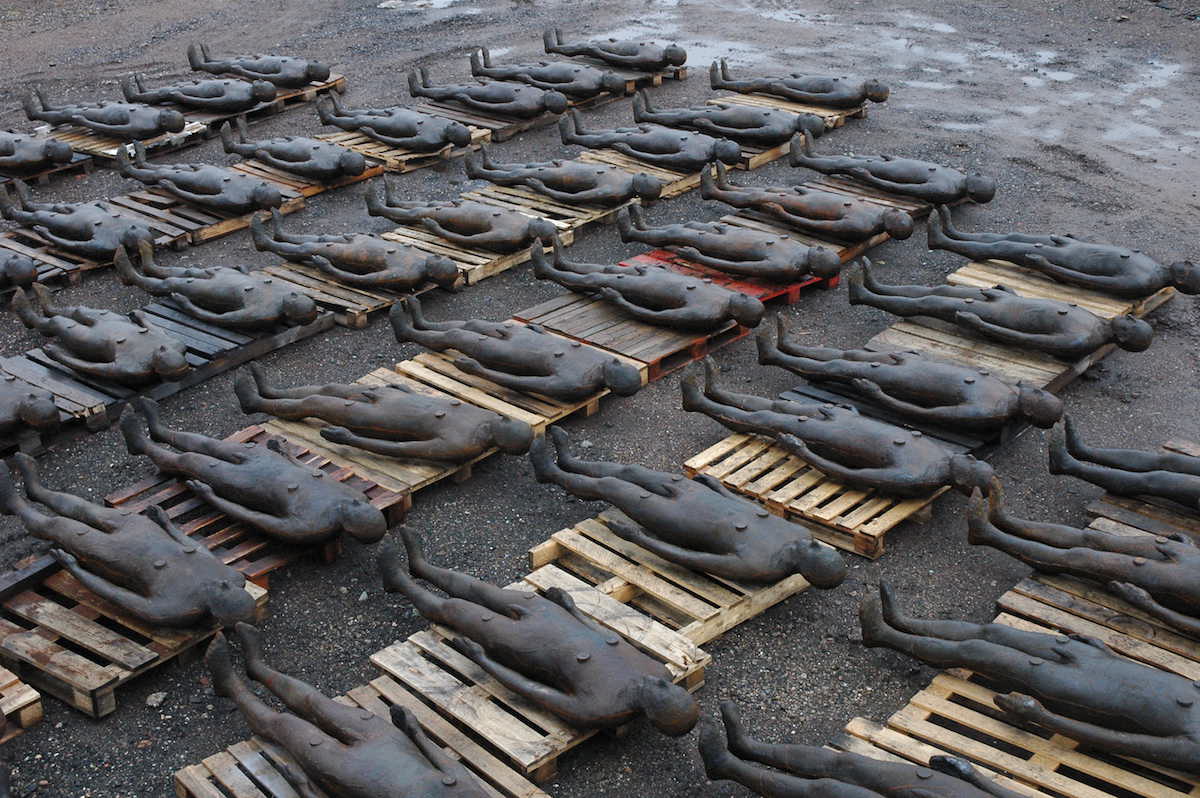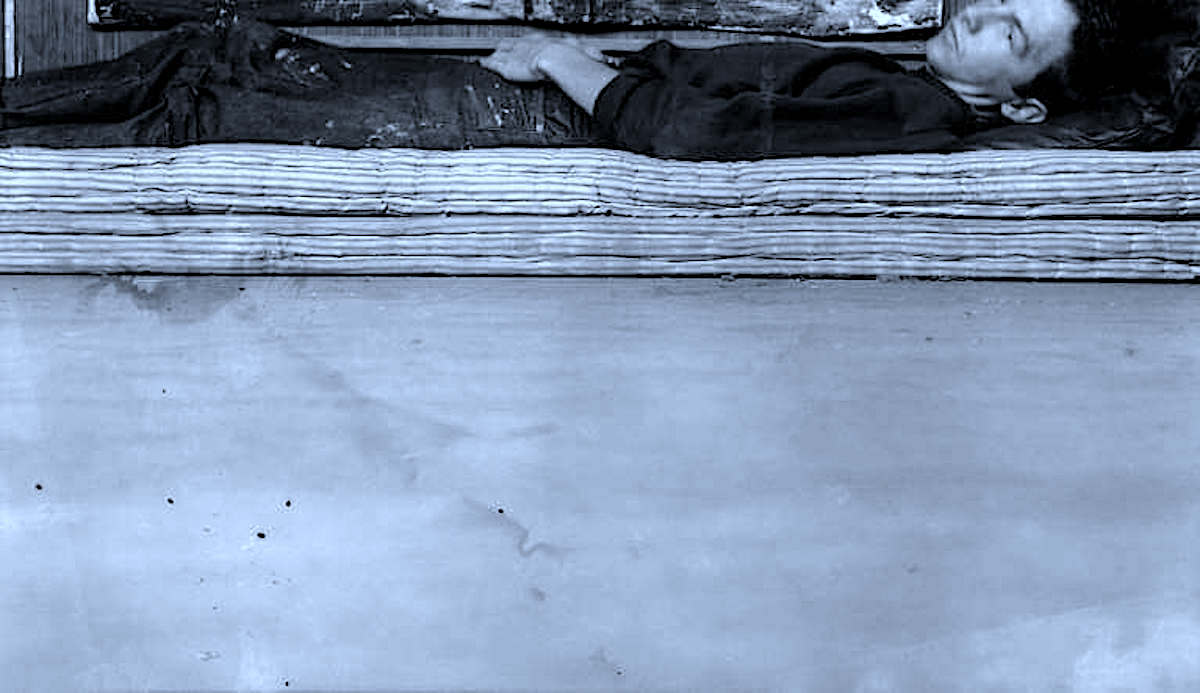La Town
2014 - Film & Video (Film & Video)
41:56 minutes
Cao Fei
Cao Fei’s video La Town, 2014 depicts a mythical metropolis that has been destroyed by unknown forces. Although the damage is obvious, as the camera navigates across the elaborate, handmade dioramas, the inhabitants of La Town carry on with their activities and the normality of everyday life pervades. As the film progresses, the latent chaos and violence begin to emanate from every corner of the miniature city: a bloody briefcase left on the ground, a kidnapping scene, an axe murderer on the loose, a ferocious man-eating octopus—all rendering the darkness of this new post-apocalyptic world order. La Town is ridden with traces of a consumer capitalist society—such as a well known German supermarket, a McDonald’s, flickering neon Shell signs, and a movie theater playing Gone with the Wind —deliberately coupled with references to different cultures and time periods in order to make it impossible to decipher a time and place. These cultural signifiers are a reflection of Fei’s own experience of the paradoxes brought by a regime that incubated a voracious hyper-capitalism in her native Guangzhou, also known as “the world’s factory.” The dialogue in the film is based on the 1957 movie Hiroshima Mon Amour directed by Alain Resnais, with a screenplay written by Marguerite Duras. In both films we hear an ambiguous and nonlinear conversation in French where a man and a woman contradict each other, extenuating the discrepancy between what is and isn’t real. As with her virtual works La Town uses the city to address Fei’s ongoing concerns: the inaccuracy of memory, forgetfulness, and a tacit existentialism as we search for a greater truth in different facets of everyday life.
Cao Fei is a celebrated multimedia artist known for works that focus on the interplay between real and fictional worlds. Working across photography, performance, video, and digital media, her practice vividly reflects the zeitgeist of the late twentieth century and the role that image production has played in shaping youth culture in a digital era. Influenced by an array of forms of global pop culture—from Cantonese Pop and Japanese anime to American hip-hop—a common thread in her practice is the merging of everyday life with new forms of technology as a means to unveil society’s unfulfilled desires. Her pivotal film Whose Utopia , for example, showcases assembly line workers in a factory in China as they act out their aspirations in a backdrop of industrial machinery. In another key body of work, RMB City, Fei created a virtual city through the platform Second Life —an online space that mimics ‘the real world’—as a vehicle to express ideas that relate to modernization, capitalism, and consumer culture. Through these constructed worlds, Fei presents a profound meditation on the boundaries between the real and the fantastic and the sense of alienation that drives new generations to increasingly experience the world behind the veneer of their Avatars. For Fei, the digital world is an expression of our human condition, and as such, an avenue to reflect on these emerging forms of social consciousness.
Colors:
Related works sharing similar palette

© » KADIST
Bruno Serralongue
2008The half-length portrait of Joe Shirley presents a man with a great presence, wearing several items that point to ancestral Native American culture...

© » KADIST
Caroline Monnet, Mobilize A screening program followed by the artist in with conversation with Adam Piron, Assistant Curator for Film at LACMA Montreal-based artist Caroline Monnet explores Indigenous identity, bicultural living, and complex cultural histories through photography, sculpture, film, video, and installation...

© » KADIST
Arash Fayez
2021The short film I Can Only Dance to One Song by Arash Fayez features a series of people from the migrant community in Barcelona singing along or dancing to songs of their choosing...

© » KADIST
Jean-Luc Moulène
2004It rains, Paris, 1st July 2000 , which could be the refrain of a song, is the title of a photograph of a minimal moment, the vision of a Parisian pedestrian, a cut flower lying on the pavement covered in rain drops...

© » SLASH PARIS
Natalia Jaime-Cortez — Hier j’ai vu une baleine dans la Seine — Espace d’art contemporain Camille Lambert — Exposition — Slash Paris Connexion Newsletter Twitter Facebook Natalia Jaime-Cortez — Hier j’ai vu une baleine dans la Seine — Espace d’art contemporain Camille Lambert — Exposition — Slash Paris Français English Accueil Événements Artistes Lieux Magazine Vidéos Retour Précédent Suivant Natalia Jaime-Cortez — Hier j’ai vu une baleine dans la Seine Exposition Dessin, installations, techniques mixtes Hier j’ai vu une baleine dans la Seine 2023 Natalia Jaime-Cortez Natalia Jaime-Cortez Hier j’ai vu une baleine dans la Seine Encore environ 2 mois : 3 février → 30 mars 2024 Le travail de Natalia Jaime-Cortez se déploie, ou plutôt se déplie, et relève d’un engagement corporel de l’artiste dont les papiers suspendus viennent dessiner des lignes dans l’espace...

© » ART & OBJECT
Zaha Hadid Architects Unveil Hydrogen Refueling Station, and More News | Art & Object Skip to main content Subscribe to our free e-letter! Webform Your Email Address Role Art Collector/Enthusiast Artist Art World Professional Academic Country USA Afghanistan Albania Algeria American Samoa Andorra Angola Anguilla Antarctica Antigua & Barbuda Argentina Armenia Aruba Ascension Island Australia Austria Azerbaijan Bahamas Bahrain Bangladesh Barbados Belarus Belgium Belize Benin Bermuda Bhutan Bolivia Bosnia & Herzegovina Botswana Bouvet Island Brazil British Indian Ocean Territory British Virgin Islands Brunei Bulgaria Burkina Faso Burundi Cambodia Cameroon Canada Canary Islands Cape Verde Caribbean Netherlands Cayman Islands Central African Republic Ceuta & Melilla Chad Chile China Christmas Island Clipperton Island Cocos (Keeling) Islands Colombia Comoros Congo - Brazzaville Congo - Kinshasa Cook Islands Costa Rica Croatia Cuba Curaçao Cyprus Czechia Côte d’Ivoire Denmark Diego Garcia Djibouti Dominica Dominican Republic Ecuador Egypt El Salvador Equatorial Guinea Eritrea Estonia Eswatini Ethiopia Falkland Islands Faroe Islands Fiji Finland France French Guiana French Polynesia French Southern Territories Gabon Gambia Georgia Germany Ghana Gibraltar Greece Greenland Grenada Guadeloupe Guam Guatemala Guernsey Guinea Guinea-Bissau Guyana Haiti Heard & McDonald Islands Honduras Hong Kong SAR China Hungary Iceland India Indonesia Iran Iraq Ireland Isle of Man Israel Italy Jamaica Japan Jersey Jordan Kazakhstan Kenya Kiribati Kosovo Kuwait Kyrgyzstan Laos Latvia Lebanon Lesotho Liberia Libya Liechtenstein Lithuania Luxembourg Macao SAR China Madagascar Malawi Malaysia Maldives Mali Malta Marshall Islands Martinique Mauritania Mauritius Mayotte Mexico Micronesia Moldova Monaco Mongolia Montenegro Montserrat Morocco Mozambique Myanmar (Burma) Namibia Nauru Nepal Netherlands Netherlands Antilles New Caledonia New Zealand Nicaragua Niger Nigeria Niue Norfolk Island Northern Mariana Islands North Korea North Macedonia Norway Oman Outlying Oceania Pakistan Palau Palestinian Territories Panama Papua New Guinea Paraguay Peru Philippines Pitcairn Islands Poland Portugal Puerto Rico Qatar Romania Russia Rwanda Réunion Samoa San Marino Saudi Arabia Senegal Serbia Seychelles Sierra Leone Singapore Sint Maarten Slovakia Slovenia Solomon Islands Somalia South Africa South Georgia & South Sandwich Islands South Korea South Sudan Spain Sri Lanka St...

© » KADIST
Pascal Shirley
2006Like many of Pascal Shirley’s photographs, Oakland Girls aestheticizes a dingy rooftop and a cloudy sky...

© » KADIST
Yael Bartana
2006Yael Bartana’s video work A Declaration was shot in southern Tel Aviv, on the visible border between that city and Jaffa...

© » KADIST
Hana Miletic
2019Incompatibles (Unitas) is made from discarded samples of the yarns that are exported from Croatia and not actually available in the local market...

© » THEARTNEWSPER
Tania Bruguera’s reading at Hamburger Bahnhof shut down after heated pro-Palestine protests Art market Museums & heritage Exhibitions Books Podcasts Columns Technology Adventures with Van Gogh Search Search Israel-Hamas war news Tania Bruguera’s reading at Hamburger Bahnhof shut down after heated pro-Palestine protests A statement from the museum says the incident involved activists using “hate speech” towards one of the readers and a museum director Gareth Harris 12 February 2024 Share Tania Bruguera invited artists, activists and members of the public, read from Hannah Arendt’s The Origins of Totalitarianism © Estudio Bruguera / Nationalgalerie – Staatliche Museen zu Berlin / Jacopo La Forgia The artist and activist Tania Bruguera’s non-stop reading of Hannah Arendt’s The Origins of Totalitarianism at Hamburger Bahnhof in Berlin was halted on Saturday (10 February) after pro-Palestine protestors disrupted the event...










